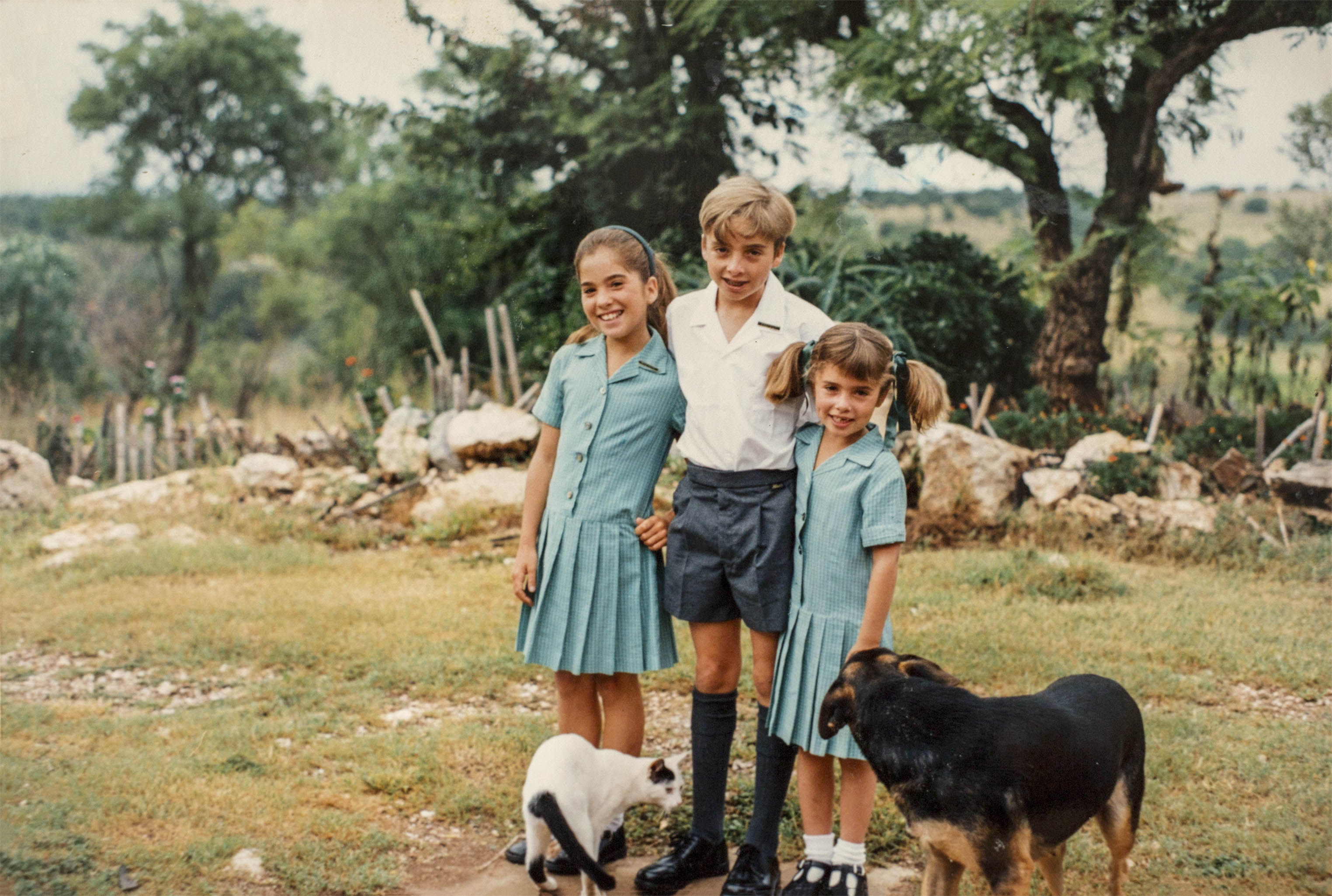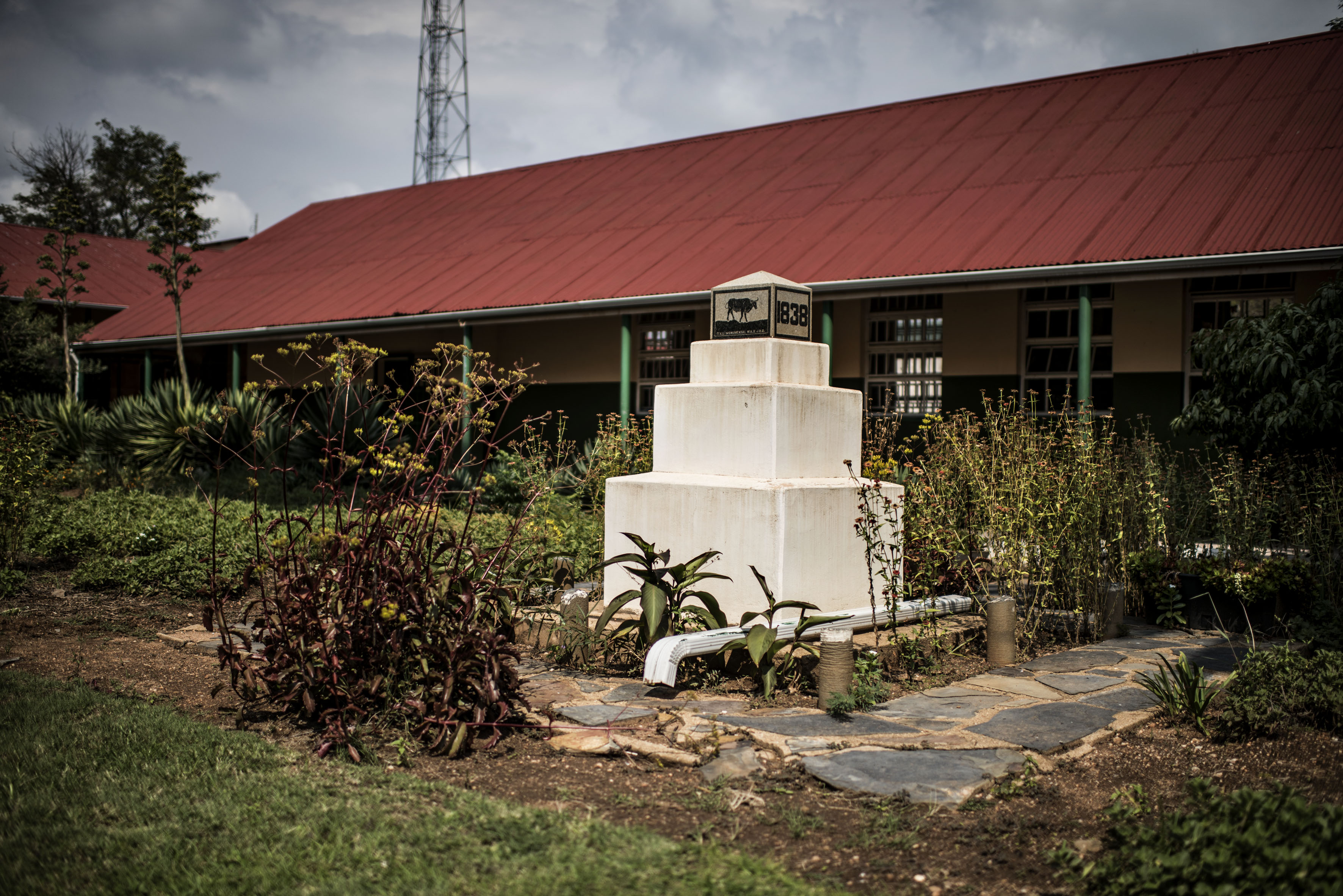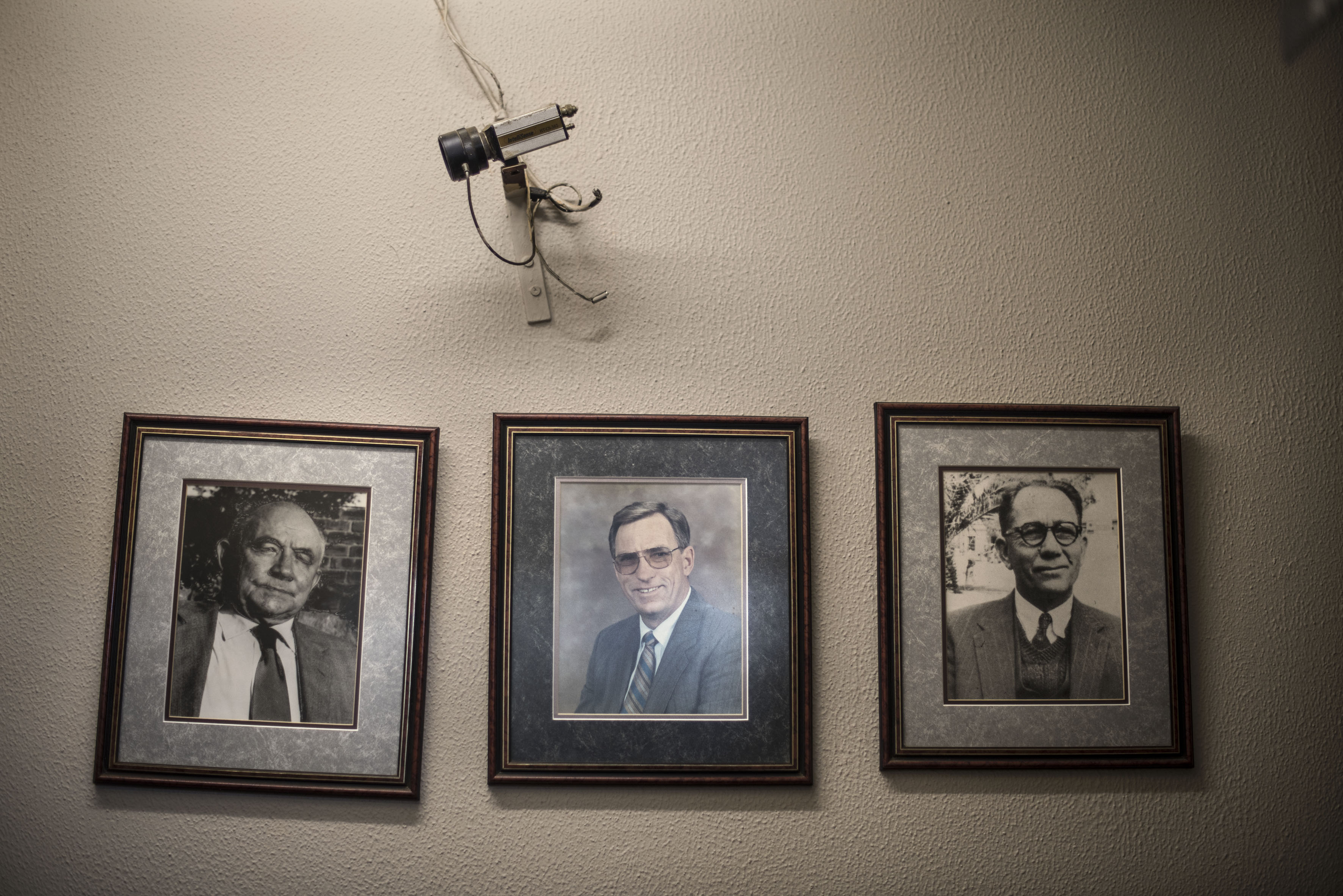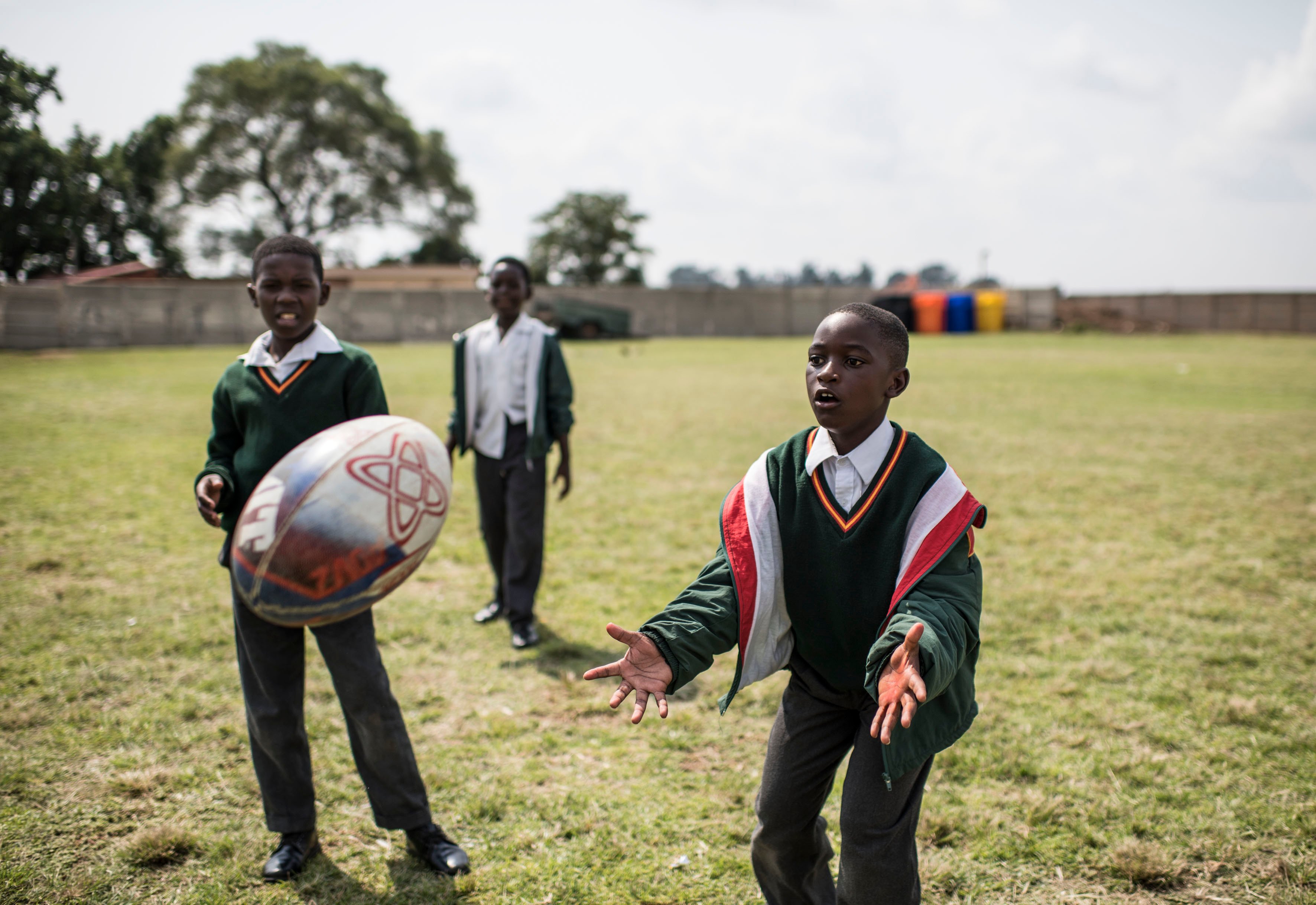Leader: Hermann Overbeek has been at Nooitgedacht 88 primary school for 35 years and has seen the school through a number of changes, always in the presence of that bastion
of conservatism. (Paul Botes/M&G)
It was in one of the classrooms near the swimming pool when I was 13 that I decided I’d had enough of God. Instead of being the reliable, diligent pupilI usually was and answering a question about Jesus during a religious studies test (with the prepared answer culled from the lesson plans), I angrily wrote a diatribe declaring something along the lines that Jesus wasn’t real and if he were,what colour were his underpants?
It was one of those typical moments of early teenage rebellion at the end of primary school and the beginning of puberty, but I stuck to it and have remained atheist ever since. It wasn’t an act of rebellion against my family upbringing — we were raised pretty much firmly secular and Jew-ish rather than Jewish — it was a reaction to the school I had been in for seven years.
Out on the Old Pretoria Road at Nooitgedacht 88, a parallel medium primary school,things seemed not to have changed that much in the first days of the democratic era. Our teachers were all Afrikaners, rugby was paramount, Afrikaner children could still walk barefoot and join the Voortrekkers and we had volkspele as an extramural activity.
Sure, a few black children had joined the ranks of the otherwise totally white student body — much to the horror of some verkrampte parents, who had tutted and spat and removed their children to more conservatively acceptable environments.
But other than that the school was still — in my mind at least — a place dedicated to the “volk, land en God” values of the old regime, where the grandsons of super-conservative Afrikaners such as Conservative Party leader Ferdi Hartzenberg and right-wing zealot Robert van Tonder mixed with the children of farmers and tradesmen.
A place where girls were called to the hall by tannies for panty inspection and where boys like me, who didn’t play rugby, were subjected to a spit-flying tirade at the beginning of every season, about how we weren’t men and definitely “moffies”, before being told to fok off and do whatever it was real men didn’t.
 Old school days: Tymon Smith with his sisters in their ‘Nooities’ uniforms.
Old school days: Tymon Smith with his sisters in their ‘Nooities’ uniforms.
It was a school where, until we were forced to sing the new national anthem, we all knew the words to Die Stem and had field trips to the Voortrekker Monument in Pretoria to remind us of the proud heritage and struggles of the Boere.
If God and the NG Kerk next door that represented him were touting the kind of fearful, often hateful stuff that I heard coming out of the mouths of teachers and fellow pupils on a daily basis, then I — a boy whose mother once sent him to school on casual day wearing a T-shirt bearing the face of the recently released Nelson Mandela and declaring “I’m for the ANC, are you?” — was happy to be done with Him. Killing God was the greatest contribution I made to the struggle against apartheid, as far as I was concerned.
 The Groot Trek monument still stands in the school’s quadrangle
The Groot Trek monument still stands in the school’s quadrangle
My religious studies teacher,a barrel-chested, athletic man named Hermann Overbeek, was, admittedly, one of the better teachers. He didn’t make me shit myself by telling me that if a war broke out between the English and the Afrikaners, he’d shoot me to keep the volk alive and he didn’t exercise the enthusiasm for the cane that so many of our teachers seemed to embrace.
In fact, as he reminds me 25 years later: “I used to take you guys into the back room and then tell you to come out holding your bums and pretend to cry before smacking my shoe to make it sound like pakslaan.”
He also didn’t send me to the office of our feared principal — a man whom you didn’t talk to if you didn’t have to, who used his belt as a means of ensuring scared rugby players made their way into the scrum, was in all likelihood a member of the Broederbond and who dished out the most dreaded hidings in a 20km radius.
For the past 18 years, Overbeek has been principal of my old primary school, steering it through transformation in the democratic era and watching it change into the school I see on my revisit — a place that looks much the same as far as its architecture, layout and location are concerned but which, otherwise, is very different and far more representative of the country.
 Grave-turning stuff: Former conservative headmasters watch from the walls.
Grave-turning stuff: Former conservative headmasters watch from the walls.
The 1938 monument to the centenary of the GrootTrek still sits in the quad outside the science classroom; the emblem of the school, with its evocations of the land and the farmers and the trekkers who first established it in 1905, remains the same; and you can still see the bell of the NG Kerk from the windows of some of the prefab classrooms at the back of the school.
The tuckshop is where it always was and the pool is still there too, but these days Overbeek is using it as a fish tank.They breed tilapia for a feeding scheme. There are also far more children than there were in my day and they’re predominantly black, from nearby places such as Cosmo City and townships that have sprung up in the area over the past two decades.
What hasn’t changed is Overbeek’s commitment to his job and his overriding and God-driven belief in what he is doing. As he tells me, dressed in his casual Friday outfit of a tracksuit and sneakers, smoking a cigarette and looking out over the playground: “I’ve always been a man with a conscience and if you’re a Christian or a believer or whatever — what you see in front of you is another human being.
“When I became principal here, I said a prayer and I thanked the Lord and I said I would not fail Him. Under those trees I made Him a promise and that’s why I’m still here. These children are my children. I strongly believe in the heart and the goodwill of man, irrespective of your cultural background or your religious background or whatever. I believe in what we are doing here.”
He’s greyer these days, his voice more gravelly and he’s a little more paunchy, but, as I watch him move around the school, constantly mobbed by enthusiastic, happy children clamouring for his attention, I realise that Hermann Overbeek is a man worth recognising for doing something in his own small way that never seemed possible to my 13-year-old self.
 Young, black pupilsnow play rugby on the sports fields.
Young, black pupilsnow play rugby on the sports fields.
Perhaps it’s because, unbeknown to me until now, he’s not really the pure-blood Afrikaner I assumed he was but rather the son of Dutch and German parents, a graduate of the Afrikaans schools of Lindenwho wanted to be a nature conservationist but ended up in his second chosen profession, arriving at “Nooities” on his second teacher’s posting in 1984.
“I’m glad that I followed this career because the children are life-changing. I’ve had a lot of problems — admin and teachers and whatever — but when I come here and I see the children it’s all worth it.”For a second, maybe, I see a few tears of emotion welling up in his eyes as yet another group of children approach for his validation of their day’s tasks.
In my day, the principal was a man to be avoided, a man who made my mother so angry that when he saw her arrive in the parking lot, looking for yet another fight, would close his door and tell his secretary to say he was unavailable. Times have certainly changed. These days, it seems that mothers are more likely to be roaring into school to thank the principal for one of his interventions rather than scold him.
I have no idea what Overbeek may believe in other than God. I’ve never sat with him around a braai and listened to him talk about his views on politics, but it seems safe to say that these days the political beliefs of educators are not part of the school environment.
When I was at school, teachers made it clear where they stood in relation to the changes that were enveloping the country. Soon after the assassination of Chris Hani, the importance and potential for violence of which was made very clear in my house, my Afrikaans teacher received a furious visit from my mother. He had come to class wearing a gun and told me that in the event of a civil war he’d shoot me and my fellow English-speaking pupils if he had to in defence of the volk.
He was forced to apologise, but it was a moment that illustrated the deep divides between the beliefs of many of the teachers and the rapid changes that were taking place in the wake of Mandela’s release. When the first two black children arrived at the school towards the end of my tenure, I remember them being the victims of horrible verbal abuse by other children.One even tried to throw a stone at the two during a break, only to hit his friend and co-conspirator in the face— an act of God if ever there was one.
For Overbeek, personal politics have no place on the school grounds. As he sees things: “We are an educational institution. I’m not a political person, although I may have my own views about politics. My first responsibility in this community is the South African child.”
And so it turns out that for the principal of Nooitgedachtthe times may have changed, but so have the children and, within the new demographics and realities of the community of the school’s 30km feeder radius and its 1300-strong school population, the 59-year-old white man in charge has found a way to ensure that he still has the support of the parents.
As he points out:“Some of the children that went to school in your years are now parents in the school, so there’s a second generation of children coming through. You can change your world if you treat everyone with respect and don’t treat anyone as a second-rate citizen — and if you respect others, then you will be respected. The parents really support me. Our parent community want the best for their children and for their children to have a future.”
There are few reminders in his office of the school of my youth,but there are several testaments to a passion of Overbeek’s that I do recall. For many years he was a regular competitor in judo championships and it is a sport that the school continues to offer — although these days it’s his brother who handles the training. For the principal, his abiding interest in the martial art is also the source of his life philosophy.
“Judo teaches you respect and humility and appreciation of the skills of your opponent, and these are things I’ve always tried to practise in my own life,” he says. Not so much a substitute for God but a companion to his religious beliefs that has helped him navigate the new world he’s firmly in charge of.
In my day we played soccer on the rugby field at break time and when we asked the principal if we could form a soccer team, we were firmly told to get fucked — soccer was a game for “k*****s” and not for the upstanding sons of good, Christian white folks. These days you can see all the soccer trophies in a cabinet in the front office, although rugby is still very much a source of pride for the school. In fact, they’ve produced several provincial players.
I can’t help but feel empathy for Overbeek when he looks over the playground and suddenly tells me: “This was my whole life. I sacrificed and I went through two divorces. I’m married again for three years to a teacher at Sharonlea and she understands the commitment and what you have to put in, and that sometimes you sacrifice your own family. I sacrificed my relationship with my own family for the school— and with my two sons. Teachers do sacrifice because you have all the children here and your focus is here and your focus is not on your family, and it happens to a lot of teachers.”
He plans to retire in a few years’ time and is adamant that: “Years from now when I’m not here any more, I don’t want a monument or anything — my monument will be where these children have a proper career so that they have a future within this country. When I retire, maybe in three years, I’ve told my staff I don’t want a farewell at a hotel or something — I want to braai on the rugby field with the ex-Nooities. I want to spend my last day here with the people and the children that have mattered in my life because they have changed who I am.”
If I get an invitation, I’ll be there — because it turns out that while I may not believe in Him, there may very well be some God left in the place where I thought I had killed Him 25 years ago.